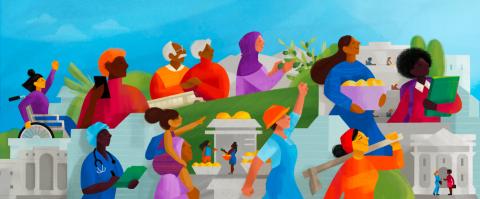European Economic
and Social Committee
EESC to represent European civil society at the UN Commission on the Status of Women for the first time
This year the UNCSW, the UN’s top annual meeting on gender equality, will focus on ending women’s poverty. During its inaugural participation in the event, the EESC will contribute to the theme with a declaration comprising ten action points for the economic empowerment and social protection of women.
The European Economic and Social Committee (EESC) delegation will take part in the 68th session of the United Nations Commission on the Status of Women (CSW68), the main international and intergovernmental body fighting for gender equality, which kicked off this week in New York. This is the first time that the EESC will be present at the UN’s largest annual gathering on women’s empowerment, to give voice to European civil society in their fight towards gender equality. The EESC delegation will be headed by President Oliver Röpke, who has made gender equality a core priority of his work and his presidency.
President Röpke said: The EESC has a long history of advocating for EU and global policies to advance gender equality and address the economic and social inequalities that women and girls struggle with today. But this is the first time we take this work, under one single voice of European civil society, to the highest possible stage in this collective fight towards global gender equality. Poverty is not gender-neutral, so neither can our response to it be.
A gender lens on poverty
The official priority theme of the 68th UNCSW is Accelerating the achievement of gender equality and the empowerment of all women and girls by addressing poverty and strengthening institutions and financing with a gender perspective
. The EESC will contribute with a declaration which encapsulates the EESC’s positions on the theme of the UNCSW68 in ten action points. They are aimed at advancing gender equality, tackling poverty and strengthening institutions through a gender perspective, in line with EU priorities.
The ten action points listed in the declaration are the following.
- Protecting women from all kind of violence, including economic violence, and drawing up policies against it, with a clear gender perspective.
- Addressing poverty among women and girls by developing economic empowerment programmes and social safety nets, ensuring adequate minimum income and decent wages, and tackling increasing homelessness.
- Ensuring accessible healthcare services and promoting sexual and reproductive health services (SRHS), as well as tackling the disproportionate distribution of care responsibilities among women and men.
- Creating financial tools to empower institutions to reduce poverty and inequality for women and girls by adopting fiscal models that make it possible to maintain reasonable and adequate social benefits.
- Promoting anti-discrimination measures and recognising the intersecting factors contributing to inequality by championing policies that address discrimination based on gender, ethnicity, race and other intersectional dimensions, with a particular focus on the struggles of women with disabilities and Roma women.
- Providing women with tools for their fair representation in the labour market.
- Empowering women to gain cross-sectoral leadership representation that enables them to make their voices and concerns heard.
- Reinforcing social policy at EU level by strengthening social dialogue and collective bargaining, and giving special protection to women and girls.
- Ensuring equal opportunities through education by giving young girls the tools to develop their skills and competences, improve their representation in science and challenge all gender stereotypes.
- Eliminating barriers that obstruct access to essential services using a gender lens on housing, energy, water and mental health.
A year from now I hope to be able to say that the EESC’s presence at the UNCSW has helped give these demands a stronger voice. We can and should be critical. We need critical voices of civil society, stakeholders, NGOs and institutions working towards this collective and shared goal: a more equal Europe, a more equal world. We can and should point to the road ahead,
President Röpke said.
EESC participation at CSW68
The EESC will form part of an EU delegation represented by the EU Presidency. It will have an observer role, together with the European Parliament. Alongside the President, the EESC delegation will comprise the following members: Christa Schweng, Mariya Mincheva, Cinzia del Rio, Maria Nikolopoulou, Chiara Corazza and Sif Holst, the President of the EESC’s Equality Group.
At the UNCSW, President Röpke will hold several bilateral meetings to present the position, achievements and demands of EU civil society on this important topic.
- On 13 March, President Röpke will meet with EU Commissioner for Equality, Helena Dalli, and a group of European NGOs and Members of the Danish Parliament.
- On 14 March, President Röpke will meet UN Special Representative on Sexual Violence in Conflict, Pramilla Patten, UNICEF’s Deputy Executive Director, Kitty van der Heijden, and Director of the European Institute for Gender Equality (EIGE), Carlien Scheele.
- On 15 March, President Röpke will meet with UN Assistant Secretary-General for Youth, Dr. Felipe Paullier, and Polish Minister for Gender Equality, Katarzyna Kotula.
Background
In 2022, 95.3 million people in the EU were at risk of poverty or social exclusion – the equivalent of 21.6% of the EU population. This risk is higher for women than for men (22.7% of women compared to 20.4% of men).
According to UN figures, 1 in every 10 women lives in extreme poverty around the world. Projections indicate that 342.4 million women and girls will not have moved out of extreme poverty by 2030 unless we shift current trends. An additional 360 billion dollars is needed to achieve SDG 5 on gender equality and women’s empowerment.
